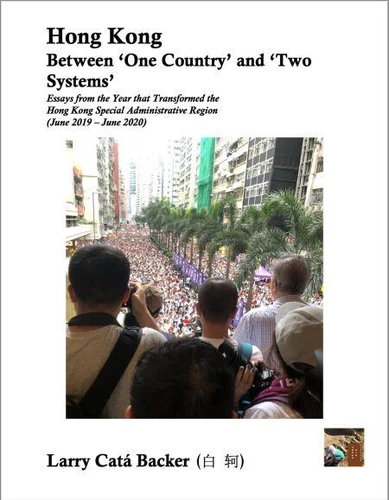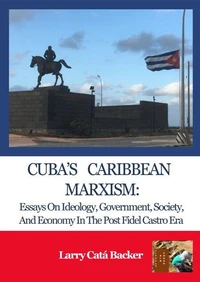Hong Kong Between 'One Country' and 'Two Systems': Essays from the Year that Transformed the Hong Kong Special Administrative Region (June 2019-June 2020)
Par :Formats :
Disponible dans votre compte client Decitre ou Furet du Nord dès validation de votre commande. Le format ePub protégé est :
- Compatible avec une lecture sur My Vivlio (smartphone, tablette, ordinateur)
- Compatible avec une lecture sur liseuses Vivlio
- Pour les liseuses autres que Vivlio, vous devez utiliser le logiciel Adobe Digital Edition. Non compatible avec la lecture sur les liseuses Kindle, Remarkable et Sony
- Non compatible avec un achat hors France métropolitaine
 , qui est-ce ?
, qui est-ce ?Notre partenaire de plateforme de lecture numérique où vous retrouverez l'ensemble de vos ebooks gratuitement
Pour en savoir plus sur nos ebooks, consultez notre aide en ligne ici
- FormatePub
- ISBN978-1-949943-03-0
- EAN9781949943030
- Date de parution14/07/2021
- Protection num.Adobe DRM
- Infos supplémentairesepub
- ÉditeurLittle Sir Press
Résumé
Hong Kong Between "One Country" and "Two Systems" examines the battle of ideas that started with the June 2019 anti-extradition law protests and ended with the enactment of the National Security and National Anthem Laws a year later. At the center of these battles was the "One Country, Two Systems" principle. By June 2020, the meaning of that principle was highly contested, with Chinese authorities taking decisive steps to implement their own understanding of the principle and its normative foundations , and the international community taking countermeasures.
All of this occurred well before the 2047 end of the 1985 Sino-British Joint Declaration (??????) that had been the blueprint for the return of Hong Kong to China. Between these events, global actors battled for control of the narrative and of the meaning of the governing principles that were meant to frame the scope and character of Hong Kong's autonomy within China. The book critically examines the conflict of words between Hong Kong protesters, the Chinese central and local authorities, and important elements of the international community.
This decisive discursive contest paralleled the fighting for control of the streets and that pitted protesters and the international community that supported them against the central authorities of China and Hong Kong local authorities. In the end the Chinese central authorities largely prevailed in the discursive realm as well as on the streets. Their victory was aided, in part by the COVID-19 pandemic of 2020. But their triumph also produced the seeds of a new and potentially stronger international constitutional discourse that may reduce the magnitude and scope of that success.
These essays were written as the events unfolded. Together the essays analytically chronicle the discursive battles that were fought, won and lost, between June 2019 and June 2020. Without an underlying political or polemical agenda, the essays retain the freshness of the moment, reflecting the uncertainties of the time as events unfolded. What was won on the streets of Hong Kong from June to December 2019, the public and physical manifestation of a principled internationalist and liberal democratic narrative of self-determination, and of civil and political rights, was lost by June 2020 within a cage of authoritative legality legitimated through the resurgence of the normative authority of the state and the application of a strong and coherent expression of the principled narrative of its Marxist-Leninist constitutional order.
Ironically enough, both political ideologies emerged stronger and more coherent from the conflict, each now better prepared for the next.
All of this occurred well before the 2047 end of the 1985 Sino-British Joint Declaration (??????) that had been the blueprint for the return of Hong Kong to China. Between these events, global actors battled for control of the narrative and of the meaning of the governing principles that were meant to frame the scope and character of Hong Kong's autonomy within China. The book critically examines the conflict of words between Hong Kong protesters, the Chinese central and local authorities, and important elements of the international community.
This decisive discursive contest paralleled the fighting for control of the streets and that pitted protesters and the international community that supported them against the central authorities of China and Hong Kong local authorities. In the end the Chinese central authorities largely prevailed in the discursive realm as well as on the streets. Their victory was aided, in part by the COVID-19 pandemic of 2020. But their triumph also produced the seeds of a new and potentially stronger international constitutional discourse that may reduce the magnitude and scope of that success.
These essays were written as the events unfolded. Together the essays analytically chronicle the discursive battles that were fought, won and lost, between June 2019 and June 2020. Without an underlying political or polemical agenda, the essays retain the freshness of the moment, reflecting the uncertainties of the time as events unfolded. What was won on the streets of Hong Kong from June to December 2019, the public and physical manifestation of a principled internationalist and liberal democratic narrative of self-determination, and of civil and political rights, was lost by June 2020 within a cage of authoritative legality legitimated through the resurgence of the normative authority of the state and the application of a strong and coherent expression of the principled narrative of its Marxist-Leninist constitutional order.
Ironically enough, both political ideologies emerged stronger and more coherent from the conflict, each now better prepared for the next.
Hong Kong Between "One Country" and "Two Systems" examines the battle of ideas that started with the June 2019 anti-extradition law protests and ended with the enactment of the National Security and National Anthem Laws a year later. At the center of these battles was the "One Country, Two Systems" principle. By June 2020, the meaning of that principle was highly contested, with Chinese authorities taking decisive steps to implement their own understanding of the principle and its normative foundations , and the international community taking countermeasures.
All of this occurred well before the 2047 end of the 1985 Sino-British Joint Declaration (??????) that had been the blueprint for the return of Hong Kong to China. Between these events, global actors battled for control of the narrative and of the meaning of the governing principles that were meant to frame the scope and character of Hong Kong's autonomy within China. The book critically examines the conflict of words between Hong Kong protesters, the Chinese central and local authorities, and important elements of the international community.
This decisive discursive contest paralleled the fighting for control of the streets and that pitted protesters and the international community that supported them against the central authorities of China and Hong Kong local authorities. In the end the Chinese central authorities largely prevailed in the discursive realm as well as on the streets. Their victory was aided, in part by the COVID-19 pandemic of 2020. But their triumph also produced the seeds of a new and potentially stronger international constitutional discourse that may reduce the magnitude and scope of that success.
These essays were written as the events unfolded. Together the essays analytically chronicle the discursive battles that were fought, won and lost, between June 2019 and June 2020. Without an underlying political or polemical agenda, the essays retain the freshness of the moment, reflecting the uncertainties of the time as events unfolded. What was won on the streets of Hong Kong from June to December 2019, the public and physical manifestation of a principled internationalist and liberal democratic narrative of self-determination, and of civil and political rights, was lost by June 2020 within a cage of authoritative legality legitimated through the resurgence of the normative authority of the state and the application of a strong and coherent expression of the principled narrative of its Marxist-Leninist constitutional order.
Ironically enough, both political ideologies emerged stronger and more coherent from the conflict, each now better prepared for the next.
All of this occurred well before the 2047 end of the 1985 Sino-British Joint Declaration (??????) that had been the blueprint for the return of Hong Kong to China. Between these events, global actors battled for control of the narrative and of the meaning of the governing principles that were meant to frame the scope and character of Hong Kong's autonomy within China. The book critically examines the conflict of words between Hong Kong protesters, the Chinese central and local authorities, and important elements of the international community.
This decisive discursive contest paralleled the fighting for control of the streets and that pitted protesters and the international community that supported them against the central authorities of China and Hong Kong local authorities. In the end the Chinese central authorities largely prevailed in the discursive realm as well as on the streets. Their victory was aided, in part by the COVID-19 pandemic of 2020. But their triumph also produced the seeds of a new and potentially stronger international constitutional discourse that may reduce the magnitude and scope of that success.
These essays were written as the events unfolded. Together the essays analytically chronicle the discursive battles that were fought, won and lost, between June 2019 and June 2020. Without an underlying political or polemical agenda, the essays retain the freshness of the moment, reflecting the uncertainties of the time as events unfolded. What was won on the streets of Hong Kong from June to December 2019, the public and physical manifestation of a principled internationalist and liberal democratic narrative of self-determination, and of civil and political rights, was lost by June 2020 within a cage of authoritative legality legitimated through the resurgence of the normative authority of the state and the application of a strong and coherent expression of the principled narrative of its Marxist-Leninist constitutional order.
Ironically enough, both political ideologies emerged stronger and more coherent from the conflict, each now better prepared for the next.




